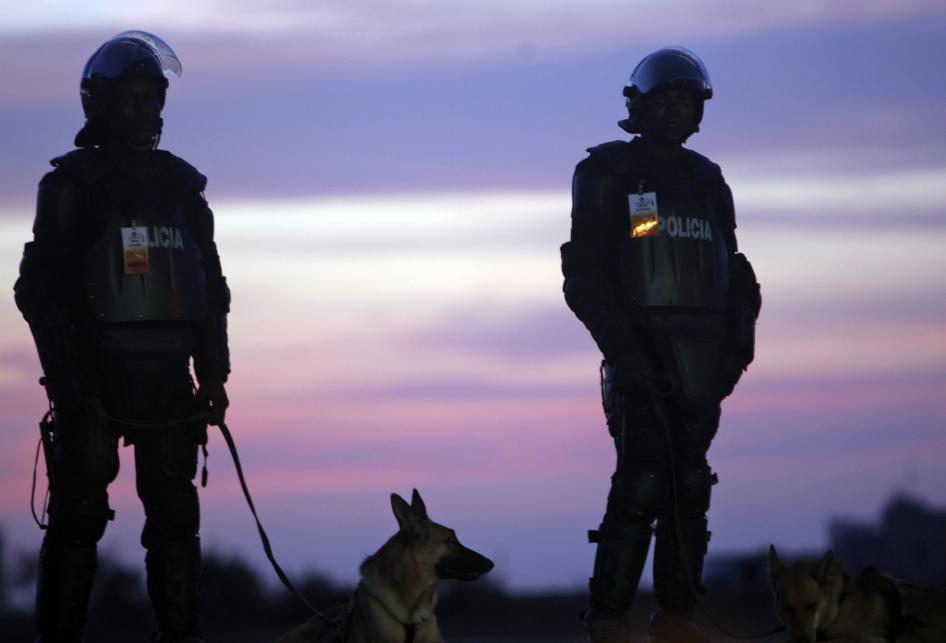(Johannesburg) – Angolan authorities should immediately ensure a prompt, independent, and thorough investigation into the killing by security forces of at least 10 unarmed protesters on January 30, 2021 during a protest organized by the Lunda Tchokwe Protectorate Movement in Lunda Norte province, Human Rights Watch said today.
Four witnesses told Human Rights Watch that Angolan security forces indiscriminately fired at protesters who had peacefully gathered to demand better public services, including water and electricity supply, in the diamond-rich town of Cafunfu. The Angolan police reported that 6 people were killed, more than 20 were injured, and 16 were detained after officers foiled what they called an armed rebellion organized by the Lunda Tchokwe Protectorate Movement. They provided no basis for this assessment or details of the circumstances that led officers to fire live rounds.
“The police use of apparently unnecessary lethal force against unarmed protesters in Lunda Norte requires an immediate and impartial investigation,” said Zenaida Machado, senior Africa researcher at Human Rights Watch. “Those found responsible for abuses should be held accountable.”
Graphic video footage shared on social media shows uniformed Angolan police officers and soldiers walking among the dead and injured on a road. A police officer kicks an unarmed man, then steps on his head. The police then put him into a vehicle marked Cuango District Police, alongside other detainees.
The Angolan police chief, Paulo de Almeida, said the protesters were members of a secessionist group that tried to break into a police station in the town of Cafunfo, in Cuango, Lunda Norte province. Several witnesses, as well as movement’s leader, José Zecamutchima, disputed the police claims. Zecamutchima told Deutsche Welle that 25 people were killed and “many have disappeared” when police went on a “shooting spree” against unarmed protesters.
Almeida rejected calls for an independent investigation into alleged excessive use of force against protesters. Instead, he said that the Angola police “will respond with violence whenever the country’s sovereignty is under threat.”
Activists and morgue workers told Human Rights Watch that police officers put nine bodies with gunshots wounds in the local Cafunfo morgue on the morning of the shooting. Two activists said that a tenth body of an unidentified man with gunshot wounds was found on February 2, in a valley near an area known as “Boss Quim.”
Two members of the Lunda Tchokwe Protectorate Movement who joined the protests said that about 100 unarmed people were singing as they marched toward a meeting point near the office of the ruling party, the People’s Movement for the Liberation of Angola (MPLA), in Cafunfo. They said that as they passed the police station, police begun to fire at them.
“My friend and I ran toward the valley and hid there,” a protester told Human Rights Watch by phone. “Many other people also hid in the valley. It was panic everywhere.”
Another man, Ricardo Zenza, said: “The police officers chased us and started firing toward us inside the valley. I saw blood, bodies… I just stayed there, praying quietly. When the policeman left, I ran home. I have been inside my house since Saturday [January 30].”
The Angolan government should publicly direct the security forces to abide by the United Nations Basic Principles on the Use of Force and Firearms by Law Enforcement Officials, Human Rights Watch said. The Basic Principles state that security forces shall “apply non-violent means before resorting to the use of force and firearms,” and that “whenever the lawful use of force and firearms is unavoidable, law enforcement officials shall: (a) Exercise restraint in such use and act in proportion to the seriousness of the offence and the legitimate objective to be achieved; (b) Minimize damage and injury, and respect and preserve human life.” Furthermore, “intentional lethal use of firearms may only be made when strictly unavoidable in order to protect life.”
The Basic Principles further provide that, “[i]n cases of death and serious injury or other grave consequences, a detailed report shall be sent promptly to the competent authorities.”
“Accountability for serious abuses by security forces is essential to prevent their recurrence,” Machado said. “The Angolan government should reform security forces to entrench greater respect for human rights and eliminate unlawful behavior.”








